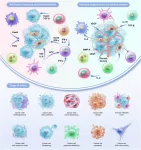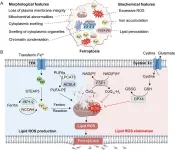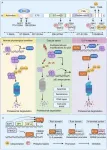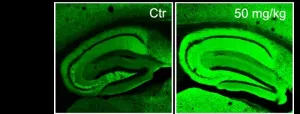(Press-News.org) Prostate cancer statistics can look scary: 34,250 U.S. deaths in 2024. 1.4 million new cases worldwide in 2022.
Dr. Bruce Montgomery, a UW Medicine oncologist, hopes that patients won’t see these numbers and just throw up their hands in fear or resignation.
“Being diagnosed with prostate cancer is not a death knell,” said Montgomery, senior author of a literature and trial review that appeared in JAMA today. Montgomery is the clinical director of Genitourinary Oncology at Fred Hutch Cancer Center and University of Washington Medical Center, and a professor of medicine and urology at the UW School of Medicine.
He encourages patients to ask their primary-care doctor specific questions about this cancer too. Montgomery also encourages his fellow doctors to bring up the question of prostate cancer screening with their patients.
“Knowing whether there is prostate cancer and how risky it is can be the first step. Not every cancer needs to be treated,” he said. “Sometimes it’s safe to just watch and use active surveillance.”
A 2024 study coauthored by UW Medicine urologist Dr. Daniel Lin showed that active surveillance can be extremely safe: 0.1% of men who opted for surveillance died of prostate cancer after 10 years.
“We need to realize that prostate cancer is not one disease,” Montgomery said. “As a provider, you need to personalize your approach to the patient you’re seeing and to the disease that they personally are dealing with.”
For example, if a 50-year-old man develops prostate cancer that is only in the prostate, then more aggressive measures may need to be considered. However, if the disease, which can be slow-moving, develops in an 80-year-old patient, the discussion may be quite different.
“I’ve seen men that age (80s) develop prostate cancer and they’ve opted for no therapy,” he said. “They know that treatment, such as radiation, might make them feel terrible ... so they just say ‘no.’
You, as their physician, he noted, must respect that.
“But if you’re 50 and have 25 to 30 years in which prostate cancer can become a bigger issue, even with the downsides, most patients should get therapy,” he said.
For more advanced prostate cancer, the number of effective treatments developed has markedly increased, as has the survival rate of men with whose prostate cancer has spread to other parts of their bodies.
“Metastatic prostate cancer needs therapy and research over the past 10 to 20 years has improved and continues to improve survival substantially,” he said. “Knowing who needs treatment, which treatment to use and when is both an art and a science.”
The article covered facts that men and their doctors should know, including:
Approximately 1.5 million new cases of prostate cancer are diagnosed annually worldwide. Approximately 75% of cases are first detected when the cancer is still localized to the prostate. This early detection was associated with a five-year survival rate of nearly 100%.
Management includes active surveillance, prostatectomy surgical removal of the prostate, or radiation therapy, depending on risk of progression.
Approximately 10% of cases are diagnosed after the cancer has spread. This stage of prostate cancer has a five-year survival rate of 37%.
The most common prostate cancer is adenocarcinoma, a type that starts in gland cells, and the median age at diagnosis is 67 years.
More than 50% of prostate cancer risk is attributable to genetic factors and older age.
Prostate cancer came to public attention, both nationally and internationally last year, when famed local travel writer, Rick Steves, announced he had developed prostate cancer. He proclaimed last month via his X account, formerly Twitter, that after radiation and surgery at UW Medicine and Fred Hutch, he was cancer free.
END
Prostate cancer is not a death knell, study shows
An overview of treatments and trends for the condition shows a steady increase in U.S. cases
2025-03-10
ELSE PRESS RELEASES FROM THIS DATE:
Unveiling the role of tumor-infiltrating immune cells in endometrial carcinoma
2025-03-10
A new review article published in Genes & Diseases sheds light on the complex molecular mechanisms through which tumor-infiltrating immune cells regulate endometrial carcinoma (EC). As one of the most prevalent gynecological cancers, EC continues to challenge researchers and clinicians due to its dynamic interaction with the immune microenvironment. This comprehensive review presents crucial insights into how immune cells influence tumor progression and how immune evasion strategies enable cancer cells to thrive.
The tumor microenvironment ...
Traditional Chinese medicine unlocks new potential in treating diseases through ferroptosis regulation
2025-03-10
Innovative insights into the role of ferroptosis, a unique form of programmed cell death, are reshaping the landscape of disease treatment. This growing field highlights how Traditional Chinese Medicine (TCM) can effectively modulate ferroptosis, offering novel therapeutic approaches for various conditions, including cancer, cardiovascular diseases, neurodegenerative disorders, and organ injuries. The powerful bioactive compounds in TCM have demonstrated the ability to regulate iron metabolism, lipid peroxidation, and redox balance, positioning them as key players in advancing modern medicine.
With its rich history of holistic ...
MSU study pinpoints the impact of prenatal stress across 27 weeks of pregnancy
2025-03-10
MSU has a satellite uplink/LTN TV studio and Comrex line for radio interviews upon request.
EAST LANSING, Mich. – A team of researchers at Michigan State University and the University of Michigan found new insights on the timing of prenatal stress and its effect on infant stress reactivity and temperament — including differences between genders.
The study, published in Psychoneuroendocrinology, is the first to examine weekly stress across 27 weeks of pregnancy to pinpoint when it most affects a newborn’s stress response and temperament — two measures that indicate infant biobehavioral reactivity.
“Prenatal ...
Biochemist’s impact on science and students honored
2025-03-10
Kayunta Johnson-Winters, an associate professor of chemistry and biochemistry at The University of Texas at Arlington, has been named a 2025 fellow of the American Society for Biochemistry and Molecular Biology.
The honor recognition recognizes her contributions to biochemistry and molecular biology and her efforts to support junior faculty, women in science and student mentorship.
“This is a tremendous honor and recognizes Kay’s important work in advancing our understanding of disease while mentoring junior faculty and student researchers,” said Morteza Khaledi, dean of UTA’s College of Science. “I’m pleased ...
ELF4: A key transcription factor shaping immunity and cancer progression
2025-03-10
ELF4, a transcription factor belonging to the ETS family, has emerged as a pivotal regulator in cell differentiation, immune system function, and cancer progression. This newly published review underscores its molecular complexity and clinical significance, shedding light on its dual role in tumor suppression and oncogenesis.
ELF4 is highly expressed in various tissues, including hematopoietic cells, placenta, and the gastrointestinal tract. Its activity is tightly controlled through post-translational modifications and intricate signaling pathways, allowing it to modulate key physiological processes. Notably, ELF4 plays a critical ...
Updated chronic kidney disease management guidelines recommend SGLT2 inhibitors regardless of diabetes or kidney disease type
2025-03-10
Embargoed for release until 5:00 p.m. ET on Monday 10 March 2025
Follow @Annalsofim on X, Facebook, Instagram, threads, and Linkedin
Below please find summaries of new articles that will be published in the next issue of Annals of Internal Medicine. The summaries are not intended to substitute for the full articles as a source of information. This information is under strict embargo and by taking it into possession, media representatives are committing to the terms of the embargo not only on their own behalf, but also on behalf of the organization they represent.
----------------------------
1. ...
New research explores how AI can build trust in knowledge work
2025-03-10
In today’s economy, many workers have transitioned from manual labor toward knowledge work, a move driven primarily by technological advances, and workers in this domain face challenges around managing non-routine work, which is inherently uncertain. Automated interventions can help workers understand their work and boost performance and trust. In a new study, researchers explored how artificial intelligence (AI) can enhance performance and trust in knowledge work environments. They found that when AI systems provided feedback in real-time, performance and trust increased.
The study, by researchers at Carnegie Mellon ...
Compound found in common herbs inspires potential anti-inflammatory drug for Alzheimer’s disease
2025-03-10
LA JOLLA, CA—The herb rosemary has long been linked with memory: “There’s rosemary, that’s for remembrance,” says Ophelia in Shakespeare’s Hamlet. So it is fitting that researchers would study a compound found in rosemary and sage—carnosic acid—for its impact on Alzheimer’s disease. In the disease, which is the leading cause of dementia and the sixth leading cause of death in the US, inflammation is one component that often leads to cognitive decline.
Carnosic acid is an antioxidant and anti-inflammatory compound that works by activating enzymes that make up the body’s natural defense system. ...
Inhaled COVID vaccine begins recruitment for phase-2 human trials
2025-03-10
Researchers at McMaster University have started a phase-2 clinical trial on a next-generation, inhaled COVID-19 vaccine.
The AeroVax study, supported by $8M in funding from the Canadian Institutes of Health Research (CIHR), will test needle-free vaccines developed to provide protection from SARS-CoV-2.
Led by Fiona Smaill and Zhou Xing, members of the Michael G. DeGroote Institute for Infectious Disease Research (IIDR) at McMaster, the multi-centre trial will evaluate the new vaccine in a broad study group, while also confirming ...
What’s in a label? It’s different for boys vs. girls, new study of parents finds
2025-03-10
A decades-old riddle poses the following scenario: A boy is injured in a car crash in which the father dies and is taken to the emergency room, where the doctor says, “I cannot operate on him—he’s my son.” Who, then, is the doctor? Many over the years have been stumped in not recognizing the answer: the mother.
Similarly, research has shown that adults instinctively think of men when asked to think of a person—they describe the most “typical” person they can imagine as male and assume storybook characters without a specified gender are men. A new study by psychology researchers shows that the way parents ...
LAST 30 PRESS RELEASES:
University of Oklahoma researchers develop durable hybrid materials for faster radiation detection
Medicaid disenrollment spikes at age 19, study finds
Turning agricultural waste into advanced materials: Review highlights how torrefaction could power a sustainable carbon future
New study warns emerging pollutants in livestock and aquaculture waste may threaten ecosystems and public health
Integrated rice–aquatic farming systems may hold the key to smarter nitrogen use and lower agricultural emissions
Hope for global banana farming in genetic discovery
Mirror image pheromones help beetles swipe right
Prenatal lead exposure related to worse cognitive function in adults
Research alert: Understanding substance use across the full spectrum of sexual identity
Pekingese, Shih Tzu and Staffordshire Bull Terrier among twelve dog breeds at risk of serious breathing condition
Selected dog breeds with most breathing trouble identified in new study
Interplay of class and gender may influence social judgments differently between cultures
Pollen counts can be predicted by machine learning models using meteorological data with more than 80% accuracy even a week ahead, for both grass and birch tree pollen, which could be key in effective
Rewriting our understanding of early hominin dispersal to Eurasia
Rising simultaneous wildfire risk compromises international firefighting efforts
Honey bee "dance floors" can be accurately located with a new method, mapping where in the hive forager bees perform waggle dances to signal the location of pollen and nectar for their nestmates
Exercise and nutritional drinks can reduce the need for care in dementia
Michelson Medical Research Foundation awards $750,000 to rising immunology leaders
SfN announces Early Career Policy Ambassadors Class of 2026
Spiritual practices strongly associated with reduced risk for hazardous alcohol and drug use
Novel vaccine protects against C. diff disease and recurrence
An “electrical” circadian clock balances growth between shoots and roots
Largest study of rare skin cancer in Mexican patients shows its more complex than previously thought
Colonists dredged away Sydney’s natural oyster reefs. Now science knows how best to restore them.
Joint and independent associations of gestational diabetes and depression with childhood obesity
Spirituality and harmful or hazardous alcohol and other drug use
New plastic material could solve energy storage challenge, researchers report
Mapping protein production in brain cells yields new insights for brain disease
Exposing a hidden anchor for HIV replication
Can Europe be climate-neutral by 2050? New monitor tracks the pace of the energy transition
[Press-News.org] Prostate cancer is not a death knell, study showsAn overview of treatments and trends for the condition shows a steady increase in U.S. cases




